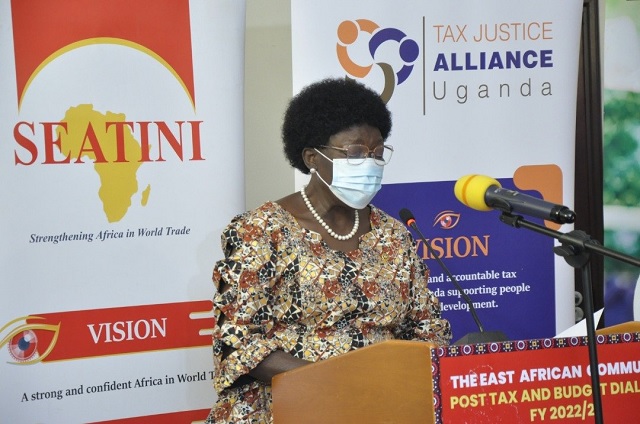
Kampala, Uganda | THE INDEPENDENT | Uganda Revenue Authority must collect 2 trillion shillings in less than 10 days left to the end of the financial year, but the tax body is worried of emerging cross-border conflicts between neighbors. This is one of the challenges that the East African countries are facing in the fight to realize the objectives of the integration process.
The clashes between the Democratic Republic of Congo government and rebels are already causing trade disruptions between the country and Rwanda and Uganda, especially after the Kisoro-Bunagana border point was closed earlier this week.
Other challenges to trade are non-tariff barriers like sudden rejection of goods at borders, national identity cards as travel documents as well as demanding travel and work visa fees, among others.
The Minister for East African Community Affairs and Deputy Prime Minister, Rebecca Kadaga hailed the countries, especially Uganda, Kenya and Tanzania for drawing budgets that aim at reviving the economies after the COVID-19 effects and monetizing economies among others.
These should all lead to increased revenue mobilization to reduce the reliance on foreign funds and tame rising debt that now stands at about US$120 billion, with Uganda accounting for US$ 21 billion.
According to the number of registered complaints, Uganda has incurred the most incidents, with all countries at one time or other, blocking her products over varying claims. Currently, Kenya still maintains restrictions on Uganda’s sugar, dairy and poultry products, while Tanzania recently opened up to Uganda’s sugar, but in limited amounts.
Speaking at the EAC Post Tax and Budget Dialogue on Tuesday, Kadaga revealed that she is due to travel to Tanzania to ensure the two countries clear the new and outstanding barriers.
Geoffrey Owich Okaka, the Assistant Commissioner Trade at URA urged the partner states to not only adhere to their own budgetary plans, but also regional commitments so as to ensure steady trade flows.
Okaka cites cross-border violations by countries arising from national and selfish politics, which usually result in clashes at borders or even border closures. He says it is trade which suffers mostly and in the end affects the government revenues.
The dialogue was also called to present an alternative view on the budget and give the civil society proposals as the EAC countries prepare to implement their budgets, and as the African Continental Free Trade Area’s full implementation starts in a few days.
SEATINI Uganda Executive Director, Jane Nalunga who presented a report on the CSO position on the Tax Amendment Bills for 2022/23 also noted concerns about the impending implementation of the AfCFTA, specifically the impending loss of revenues.
She says that while the treaty opens borders to free trade by reducing or removing tariffs, there will be an expected revenue loss, yet according to her, there are no remedies to address this challenge.
Uganda and other low developed countries will liberalise up to 97 percent of their tariff lines (goods that attract customs taxes) over a period of up to 13 years. The other three percent retained by the country are the goods that are considered sensitive and therefore risky to open up to the international competition.
As a result, Uganda will lose up to 13.3 million dollars in customs taxes. However, the Director Budgets at the Ministry of Finance, Moses Kaggwa says that revenue loss is insignificant compared to what URA collects annually, and can therefore be sacrificed for the bigger picture.
He says the government has put in place measures to ensure increase in revenue collections without increasing taxes, but instead going for more people who have not been paying.
The national tax register has only about 2.5 million taxpayers, out of 7.5 million people engaged in gainful income. One of the objectives of URA this year is to ensure more people are brought into the register.
However, Kaggwa agreed with other experts that exemptions are becoming unjustifiably too costly to the revenue sector, and that something must be done to control it.
George Stephen Odongo, Uganda’s representative at the East African Legislative Assembly on his part said instead of thinking about the expected revenue loss, the countries and the private sector in particular, should be looking at increasing production.
He stressed the need for diversified production so that the EAC countries can increase trade amongst themselves, but also build the capacity to counter the inflow of imports.
The Ministry of Finance, Planning, and Economic Development has tasked URA to collect 25.5 trillion Shillings in the next financial year, up from the current 22.3 trillion Shillings.
However, for the current year which ends on June 30th, the tax body has so far collected 2 trillion less than the annual target, meaning this has to be collected within the remaining nine days.
The Assistant Commissioner Public and Corporate Affairs, Ibrahim Bbosa, says that they have in place measures that can ensure the money is realized.
*****
URN
 The Independent Uganda: You get the Truth we Pay the Price
The Independent Uganda: You get the Truth we Pay the Price





